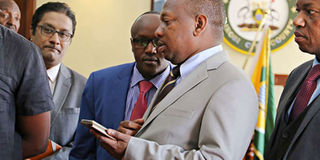‘Sonkogate’ impeachment saga shameful political manoeuvre

Nairobi Governor Mike Sonko with county officials during an executives' meeting at City Hall on January 19, 2018. PHOTO | FILE | NATION MEDIA GROUP
What you need to know:
- There is the Equator and the Nairobi equator; the latter is anchored on the partial cleanliness of the capital city circa 1985 and beyond.
- I remember my father telling me public toilets in Nairobi were so clean during their era (1965) that you could dine inside them comfortably.
Trust me, I yap a lot about rule of law but the events that unfolded at Nairobi City County recently got me to change my gear a little. Call it ouster or ‘Sonkogate’.
There are no straight answers to all the questions we would ever have for what befell this once-magnificent Green City in the Sun. I always ask myself whether to start with the cabbage or garbage when it comes to Nairobi.
I opine, as always, that cabbage would be an easier conversation to have if you lived in the plush parts of Nairobi that was guaranteed of regular refuse collection after your cabbage salad.
Garbage it would be, of course, if you were in whatever ‘lando’ you occupied and refuse collection was an extinct language, in that your street was the obligatory cabbage compost.
PARTIAL CLEANLINESS
There is the Equator and the Nairobi equator; the latter is anchored on the partial cleanliness of the capital city circa 1985 and beyond.
I remember my father telling me public toilets in Nairobi were so clean during their era (1965) that you could dine inside them comfortably.
The one and only time I set foot in them, decades later, I found them beyond revulsion. I learnt later that cartels within Nairobi had instituted a hostile takeover and were, in fact, fighting over their (mis)management. How now? Nairobi’s economy must be either bad or mad, I thought.
There is a whole generational shift between my father’s era and mine. To think that with the humble socioeconomic disadvantages they could live better than us is very telling of the ethical challenges our country faces, population explosion aside. What was done differently in the ‘60s to ‘80s that made Kenya a success story?
Some citizens bleed the stone and into them to succeed — literally! Others breeze into success on a flying softest carpet of corruption. For other people, failure was not of their fault.
However trustingly and dedicatedly they voted, they failed. They put all their eggs in one man or woman’s basket to rescue them from poverty but came a cropper. Is it the vote, the voter or the voting system to blame, one would wonder.
COLLECTIVE FAILURE
Given the type of leaders that we have churned out, something or someone (us) has got to be the reason for our collective failure in Nairobi and, indeed, many counties with poor leadership. There is internet virus and there is coronavirus, we are now told, but we had our own political virus (vifaranga) that brought its own type of flu called rigged elections.
Where, exactly, is the success gauge when it comes to the victory of many an incumbent MCA, MP, governor et al if all the electoral scheming was for their blinging neck and nowhere else?
There have been debates around the legality and omissions in the ‘takeover’ of Nairobi. What we have not heard or bothered to broach is the issue of ethics.
The central government’s decision straddles the thin edge of law and ethics. Do you take action to save a rape victim and get the police immediately or stand by, hands behind back, lazy eyed, and call the police later? Those are the hard questions Kenya faces on its mismanaged organisations.
I am not taking sides here but, given the difficult position we have put ourselves in through cyclical unfair and ‘rigged’ elections, which is the better of the two between law and ethics when it comes to intervening to save the citizens from abuse by a miscreant?
Then you ask, who is the lesser of the two evils between the national government and the county government — both with integrity clouds hanging over them? Chicken and egg theorem, it seems.
Law and ethics are two sides of the coin and intertwine to create a moral society. The former is mechanical in nature and the latter based on our rational thoughts and reasoning to determine right and wrong. Reacting morally forms the basis of ethical thinking, and not in a religious form but conscionably.
SELF-PRESERVATION
Interfering with a democratic process such as impeachment is both a legal and ethical matter. When the impeachment process is halted, then it becomes political self-preservation rather than interfering for ethical or legal purposes. Not to mention its damaging effect on our democratic processes.
A murderous mafioso can legally win elections in Kenya but it is not ethical to let him or her lead, as a deterrent to would-be bad leaders.
Our problem, therefore, is not the law but lack of ethics. We can tweak and twist the legislation to our heart’s content but, if we do not act and behave ethically, we might as well kiss goodbye the notion of a prosperous and democratic country. Law has impetus and meaning only when backed with ethical values, not political ends.
Counties have legal mandates that include impeachment and they should be allowed to apply them free of interference, even political.
Ms Guyo is a legal researcher. [email protected] @kdiguyo





